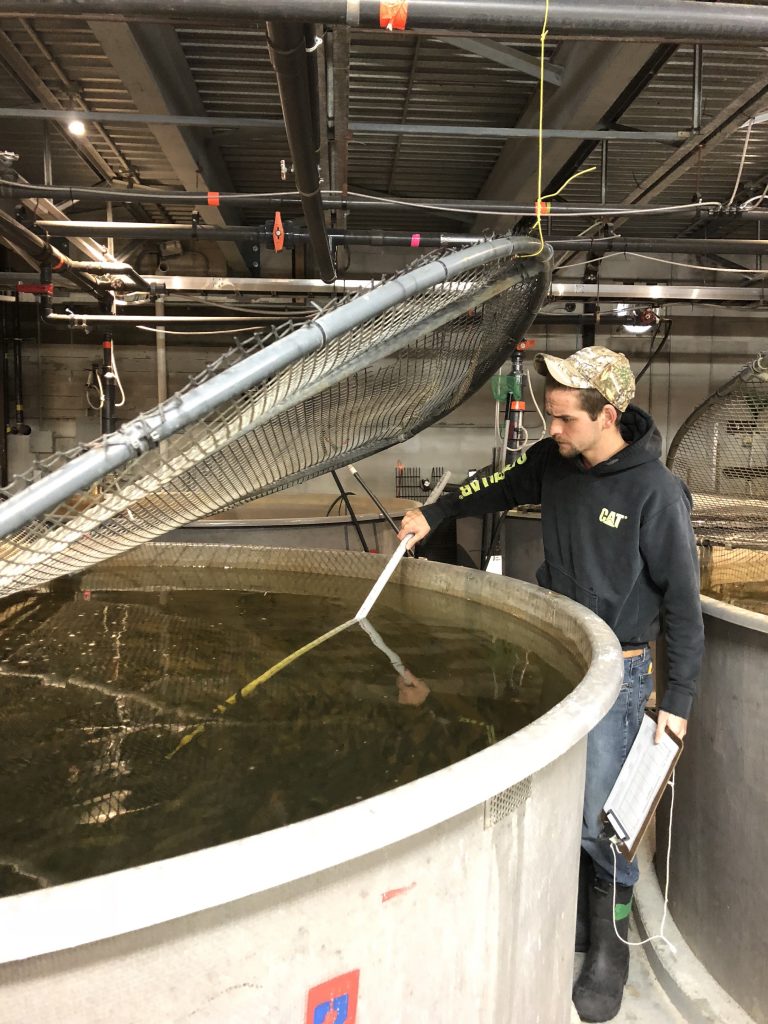
Features
Education
Management
Skilled labour
December 20, 2018 By From the experts at The Freshwater Institute
 The expanding land-based aquaculture industry requires skilled staff
The expanding land-based aquaculture industry requires skilled staffThe expanding land-based aquaculture industry requires skilled staff, and experienced RAS operators remain in demand. However, there are many opportunities at both new and existing facilities for new operators to develop confidence in operating RAS.
Dream team
A well-rounded team with diverse expertise including trades, engineering and biology is paramount. Diverse skills increase in-house capacity and ensure a wide range of challenges can be recognized and resolved quickly. Fostering collaboration within the team improves communication between areas of the facility or between shifts, affords opportunity for cross-training, and boosts confidence that the burden of operating the facility is spread over many capable hands. It is important to invest appropriate time and resources to properly train new hires, so work is performed to standard and chances for success of both individuals and the team are maximized.
Learning on the job
The construction and commissioning phases at new facilities is a unique opportunity for operators to observe components such as underground piping and electrical service entries that may be important in future facility planning. This opportunity allows staff to observe how system components fit together and provides perspective of equipment in new condition versus future wear-and-tear. Staff participation in commissioning is great training in a low risk setting to learn system manipulations and experience components operating at design specifications.
System startups and shut-downs at existing facilities offer similar opportunities to simulate alarm conditions and practice emergency response. This time should also be used to assess equipment condition and perform intensive maintenance or replacements, maximizing system reliability for the next cohort of fish.
Minding maintenance
A maintenance plan with intensive checks on essential equipment increases longevity and reliability of mechanical parts. Performing regular preventative maintenance helps operators become familiar with location, function and normal operating conditions. Checks help identify failing equipment so replacement can be scheduled at opportune times, and not during a crisis with high risk to livestock.
Emergency back-up generators should be checked for vital fluids and error codes, and abnormal conditions addressed immediately. It is important that generators be exercised, and load tested to ensure they will power life support systems or when adding additional load at the facility.
Emergency oxygen diffusers should be tested and cleaned regularly and confirmed to support the most densely stocked tanks, with capacity added if needed. Set points for oxygen activation should be considered and may change based on stocking density. For example, dense tanks may require higher activation settings to prevent dissolved oxygen concentrations from reaching dangerous levels that cannot be recovered in an emergency.
Alarming equipment back-up batteries should be checked and tested to confirm that alarm conditions are detected, but also that they will successfully notify staff. Vital conditions should have redundant sensors or dial out pathways. Install adequate alarms to detect failures but avoid excess that creates nuisance alarms or alarm flooding. Depending on scale, facilities should consider 24/7 on site coverage.
Always check back-up systems and alarming prior to hazardous weather forecasts and have back-up fuel and liquid oxygen tanks topped off if necessary. It is important to establish strong relationships with local vendors that can provide support during emergency situations. Knowing that back-ups are operational and will sustain livestock are huge confidence boosters.
Inventory
Even with good maintenance, parts will fail unexpectedly. Having essential or long lead time components on hand provides peace of mind. Back-up parts inventory should be monitored with logs or software, alerting operators when to order more. Record keeping that identifies commonly failing parts may guide decisions to upgrade or new vendors. When possible, strive for uniformity in components to reduce inventory needs and uncertainty selecting parts. Keep a file of system design drawings and equipment manuals for reference to part numbers, specifications, and troubleshooting procedures.
Emergency response
Effective emergency response procedures boost confidence in crisis situations. Alarm situations should be simulated during work hours for practice. Also, simply discussing possible scenarios with the response team and what measures should be taken will help when responding. When an alarm is received, communicate with the team and confirm someone is responding. While in route, try to hypothesize the most likely scenario based on the alarms received to speed triage upon arrival. When on site, maintain focus to assess the situation and mobilize available resources. Following any emergency response, review the events to discuss the problem, the corrective measures taken, and create an action plan to prevent reoccurrence.
External resources
Operators should feel comfortable contacting specialized research institutes, universities, and extension resources that can assist with challenges at RAS facilities. Additionally, making contacts with operators at other facilities affords opportunity to share ideas and techniques. RAS-specific training courses and conferences are good venues to meet other professionals and improve one’s knowledge base to build confidence operating RAS.
Print this page